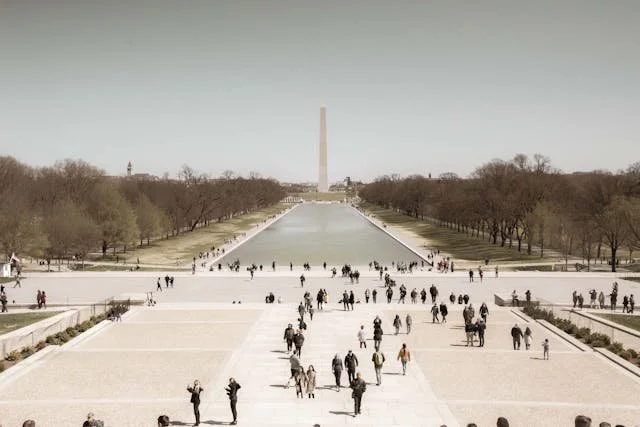The Siren Song of Safety
Photo by David Yu: https://www.pexels.com/photo/people-in-lincoln-memorial-park-4261614/
So now they tell us that Washington, D.C. needs saving from itself. The powers have rolled out the familiar drumbeat: crime is up, chaos is loose, order must be restored, blah, blah, blah. (Appearances to the contrary notwithstanding, violent crime statistics in Washington, DC, have declined at a faster rate than elsewhere in the country.)
And, right on cue, comes the parade of uniforms, curfews, and sweeping mandates promising that this time the city will be made safe.
But whose safety, exactly?
When politicians talk about "restoring order," they rarely mean the order of mothers sleeping without fear of a midnight knock. They rarely mean the order of young Black men walking home without being shadowed, stopped, or slammed against the nearest wall. They rarely mean the order of immigrants tending their shops without worrying that a paperwork technicality could make them disappear.
Instead, they mean the kind of "order" that lets the comfortable stay comfortable, the wealthy keep their distance, and the status quo go unbothered.
It's the order Pharaoh wanted when he called Moses a troublemaker.
It's the order Rome demanded when it nailed the Prince of Peace to a cross.
Now, I'm not here to deny that neighborhoods hurt. People get robbed, families get broken, lives get lost. That pain is real.
But here's the thing: whenever we reach for the same old tools, more prisons, more force, more surveillance, we’re not actually fixing what’s broken. We're just making the broken invisible to those with the luxury of looking away.
Jesus didn't walk into Galilee with a riot shield and a baton. He came with a table set wide enough for people who'd been told their whole lives they didn't belong. He confronted the unjust systems that fed on the misery of the vulnerable. He didn't just promise "law and order." He promised peace and justice.
The reign of God isn't impressed with the fragile calm you get when people are too scared to step out of line. It yearns for a deeper kind of peace, the kind that grows out of relationships made right, where neighbors can actually breathe because their dignity is respected and their needs are met.
In God's new realm, justice isn't a courthouse formality or a soundbite polished for the evening news. It’s the daily bread of a community where nobody gets thrown away and nobody gets to live beyond accountability. This vision won't be satisfied with the uneasy calm that comes from silencing people. It seeks the deep harmony that happens when wrongs are set right, debts are wiped clean, and power is spent protecting the people who need it most instead of guarding the privilege of those who already have more than their share.
That's why this latest "law-and-order" sweep in D.C. ought to make us twitchy. Sure, it might quiet the streets for a while. But it won't heal the wounds that make those streets dangerous in the first place. It can keep people in line without ever making them whole.
God's new creation won't be fooled into thinking that order is the same thing as life. It keeps pressing the question: Do our systems serve the ones with the most to lose, or do they mostly protect the ones who sleep just fine at night? And it won't bless a peace purchased by pushing the poor, the immigrant, and the marginalized further to the edges. It insists on a peace that only comes when justice rolls down like water and righteousness like an ever-flowing stream.
So I have to ask: what if "making the city safe" looked less like sweeping the streets and more like sweeping away the hopelessness?
What if we spent as much time breaking the cycles of poverty as we do breaking down doors?
What if we measured public safety by the presence of justice, not just the absence of visible crime?
“Because the days are surely coming,” says the Lord, “when safety will not be something you buy with tax dollars and barbed wire, but something you live because love has set things right.”
And if we‘re serious about following the Jesus who shakes kingdoms, those days can't come soon enough.

